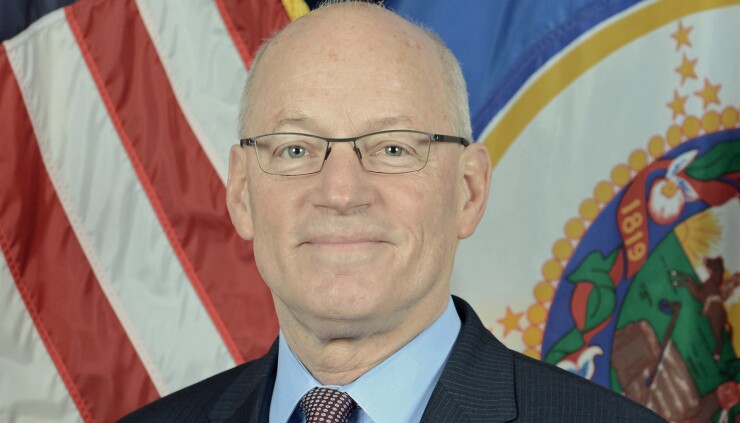Minnesota’s fiscal chief, Myron Frans, is handing over the reins of Minnesota Management and Budget to his predecessor Jim Schowalter who inherits a multi-billion dollar COVID-19-driven deficit along with healthy reserves to help weather the fiscal storm.
Frans is leaving after serving 5 years as MMB commissioner under Gov. Tim Walz and his predecessor Mark Dayton, both members of the Democratic-Farmer-Labor Party, and as revenue commissioner for the prior five years during which he helped shape the state’s fiscal health from a partisan 2013 tax overhaul to 2018 bipartisan

It was during his tenure under Dayton as revenue commissioner that his work on a new income tax bracket laid the groundwork for the state’s move to structural budget balance and years-long reserve building, Frans said.
The state’s latest
“This would have been a much more miserable year” without the reserves that provide the state with time to adjust, Frans said in an interview. “We have a lot of tools at our disposal” and can deal with the gap through a mix of reserves, budget cuts, and other measures.
“Everything has to be on the table” and while it may turn to some one-time measures, the state will get back to structural balance, Frans said. “We know exactly how to do this.”
While the pandemic’s fiscal strains are daunting, Minnesota must also confront civil unrest and divided state political leadership could make sound solutions harder to come by. Past structural woes mounted and a government shutdown were hallmarks of past divisions.
Frans
Frans leaves with some advice: cooperation is needed to avoid past patterns that led to the loss of the state’s top ratings. The state has since earned upgrades and carries AAA ratings from Fitch Ratings and S&P Global Ratings and the Aa1 of Moody’s Investors Service.
Lawmakers might also serve the state well by exploring procedural changes on capital spending packaged in what’s known as the “bonding bill” to at least prevent basic maintenance from getting caught up in political policy feuds.
The bond package also offers the opportunity to address equity and investment issues receiving attention in the civil unrest that followed the May killing of George Floyd by a Minneapolis police officer, which Frans said shouldn’t be held up over political bickering.
Frans, who holds a law degree and was a partner at Faegre & Benson LLP, joined the Dayton administration in 2011 from the private sector as commissioner of the Department of Revenue.
In 2014, he replaced Schowalter as MMB commissioner when Schowalter left after 20 years working in state financial roles. He moved over to the Minnesota Council of Health Plans and then to HealthPartners as a senior vice president working on provider partnerships.
Schowalter’s tenure included managing multi-billion dollar deficits during the Great Recession and his leadership roles spanned both Democratic and Republican administrations as he was budget director under former Gov. Tim Pawlenty, a Republican.
“At a critical time for our state, Jim Schowalter will bring extensive experience and a proven track record of effective governance,” Walz said in announcing his return to MMB.

Frans said after a decade with the state he was ready for a change but wasn’t ready to retire.
The university position became available and Frans discussed with Schowalter his availability who met with Walz and was offered the job. With Schowalter lined up, Frans believed he would leave the state is good hands and so he decided to make the leap.
As a first-generation college graduate “it’s a bit of a dream come true” to join the university and guide it manage through its own pandemic strains to aid the education of future generations. Frans is a Kansas native who took a tax law job in Minnesota in 1985 and has since made the state his home with his family.
The MMB commissioner is the state’s chief financial officer, chief accounting officer, state controller, chief human resource officer, and in charge of employee insurance for over 50,000 state employees and collective bargaining on behalf of the state. The office includes the budget director and debt manager positions.
Frans counts the 2018 bipartisan pension
Dayton had sought a tax increase to help eliminate a $5 billion deficit in 2011 but majority Republicans refused and the fixes relied on accounting gimmicks and one-shots like a tobacco borrowing.
The state lacked sufficient revenue with a growing imbalance in the division between income, property, and sales tax revenues.
“We laid a lot of groundwork and traveled around the state and met with thousands of people and legislators and talked about how current tax system was broken,” Frans said.
Dayton’s plans came to fruition when the Democrats won a majority in both legislative chambers in the November 2012 election and the state later adopted the tax changes that lowered but broadened the sales tax and established a new 9.8% income tax bracket on about 7.8% of earners.
The infusion of cash and a recovering economy eventually closed the budget gap, allowed the state to make up delayed school payments and move toward structural balance and build up reserves.
“We got the new revenues” but we also “managed our expenses,” Frans said. “You have to monitor spending, save for a rainy day and invest in the things people want.”
Republicans later gained control of the legislature and that has led to clashes, notably in 2017 when one of the state’s bond ratings was jeopardized due to a feud between Dayton and the GOP over taxes that held up an appropriation to repay debt issued for the Senate office building.
Republicans now hold a Senate majority but the DFL Party regained the a House majority in 2018, when state Senate seats were not on the ballot. All seats in both houses are up in November.
“Divided government is hard, but that’s what people like,” Frans said noting that the state did reach a budget agreement last year. “It really puts a lot of pressure on both sides to come together and agree.”
The state now grappling with a deficit in an acrimonious election year with the added tensions of a pandemic and how to respond and civil unrest.
“There’s so many forces that are coming together to make it difficult to compromise,” Frans said. “Governing is all about compromising.”
Absent passage of the stalled federal package that would provide relief for state and local tax revenue losses, the state must close a $2.4 billion budget hole as the pandemic erased a previously projected $1.5 billion surplus.
Frans has stressed the state can’t dig too deeply into the reserve given the pandemic’s uncertain course and impact on state finances.
“We believe that a significant use of reserves in this biennium would diminish the state's flexibility to address the next biennium's projected gap…and react to any future revenue or expenditure volatility,” S&P credit analyst Cora Bruemmer said in a report this summer ahead of the state’s $1.2 billion issue. The rating agency moved the outlook on its AAA rating to negative.
The state has $6.4 billion of general obligation debt. The state achieved
The state’s capital spending, assembled in annual bills with the bulk of spending authorized in the year following passage of a two-year operating budget, offers an opportunity to help promote community investment but this year’s bill has stalled, collateral damage in a fight over the governor’s coronavirus powers.
The legislature closed out its regular session in May without passing a public works funding package and
Frans said the state needs to explore how to ensure that simple investment in at least existing assets isn’t held up by politics. The state needs a “way to maintain a regular rhythm,” he said.
Proposed investments in the package also could help aid healing over social issues that have taken center stage following Floyd’s killing as it included $30 million of investments in local community organizations.





